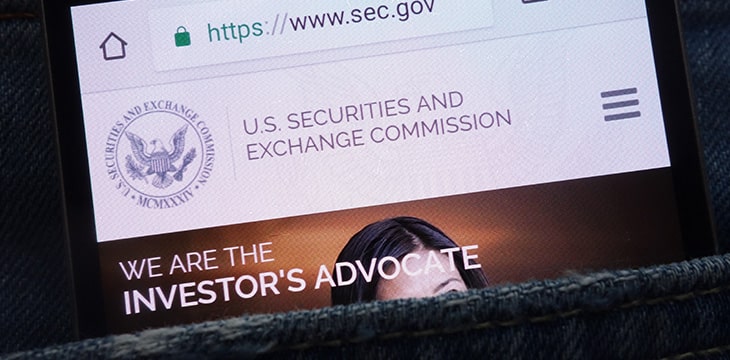|
Getting your Trinity Audio player ready...
|
U.S. securities regulators have charged 11 individuals for creating and promoting the “fraudulent crypto pyramid and Ponzi scheme” that is the Forsage ‘decentralized networking platform based on smart contracts.’
On Monday, the U.S. Securities and Exchange Commission (SEC) laid charges of fraud and the unregistered offer and sale of securities against the four international founders of Forsage, as well as three U.S.-based social media promoters and several U.S.-based members of the so-called ‘Crypto Crusaders’ promotional group.
Forsage.io, which convinced “millions” of users to enter into transactions via smart contracts on the Ethereum, Tron, and Binance blockchains, was launched at the end of January 2020 by Vladimir Okhotnikov, Mikhail Sergeev, Sergey Maslakov and Jane Doe aka Lola Ferrari. The SEC says the four founders are believed to be residents of Russia, the Republic of Georgia and Indonesia.
The SEC alleges that Forsage is “a textbook pyramid and Ponzi scheme,” with “no apparent source of revenue other than funds received from investors.” Investors who purchased so-called ‘slots’ in Forsage’s smart contracts could only make money by recruiting fresh marks into the scheme and participating in ‘spillover’ profit-sharing. The more slots an investor purchased, the greater the promised future payout, assuming they were able to continue bringing new suckers to the table.
Forsage’s founders, whom the SEC says have “prior experience in MLM [multi-level marketing] projects,” coded smart contracts that would route investor funds to other investors’ wallet addresses. But the founders also included code that paid out a portion of investor funds to wallets not associated with any Forsage investor, despite marketing materials that claimed “100% of the income goes directly and transparently to the members of the project with zero risk.”
The SEC says the founders had a falling out in March of this year, with Okhotnikov being cut off from access to the Forsage website and Telegram channels but retaining control of its YouTube channel, which has over 41,500 subscribers. Okhotnikov used this YouTube channel to criticize a new MLM scheme concocted by Ferarri and Sergeev known as Express Smart Game, while Okhotnikov launched a similarly scammy project called Meta Force.
Before this falling out, the accused influencers made multiple appearances on Forsage’s YouTube channel, making all sorts of wild promises and personally testifying as to the lucrative nature of investing in the scheme. These videos were intended to be “leveraged” by Forsage investors to help them recruit fresh meat.
The Crypto Crusaders were labeled “the most successful Forsage promotional group” in the U.S., thanks to the 75,000 subscribers on its YouTube channel and Facebook group. The influencers made outsized claims of success, including personally making “life changing money,” turning a $1,600 investment into $1 million in just seven months and developing numerous six- and seven-figure “earners” among new recruits.
The SEC claims that Forsage had raised as much as $2.9 billion from the sale of slots as of May 2021. From this haul, the founders jointly received millions while the influencers were collecting six-figure sums.
Forsage’s activities resulted in the SEC’s Philippine counterparts issuing a public warning in June 2020 that Forsage was offering unregistered securities, followed a few months later by a declaration that the operation was most definitely a fraud. In March 2021, Montana’s Commissioner of Securities and Insurance issued a cease and desist order against Forsage after receiving multiple complaints from investors.
The accused dismissed all these regulatory brushback pitches as false, doubling down on their insistence that Forsage was a legit operation. The SEC notes that Forsage influencers didn’t tolerate “negative statements about Forsage” and threatened to banish investors who complained or failed to bring in a sufficient number of new recruits.
Two U.S.-based defendants have already reached settlement deals with the SEC. Samuel D. Ellis of Louisville, Kentucky and Sarah L. Theissen of Hartford, Wisconsin agreed to be permanently enjoined from future violations of securities laws and to pay disgorgement and civil penalties. Both settlements are subject to court approval.
Commenting on the Forsage action, Carolyn Welshhans, Acting Chief of the SEC’s Crypto Assets and Cyber Unit, said “fraudsters cannot circumvent the federal securities laws by focusing their schemes on smart contracts and blockchains.”
The SEC is getting much more assertive in its approach to reigning in digital asset shenanigans, with recent reports of probes into Coinbase (NASDAQ: COIN) for listing unregistered securities following an insider trading scandal at the struggling cryptocurrency exchange. That action came shortly after members of a congressional subcommittee challenged SEC officials as to why, if digital assets were indeed unregistered securities, the regulator wasn’t getting tougher with exchanges who list these assets.
The SEC is currently in a jurisdictional turf war with the Commodity Futures Trading Commission (CFTC) over which agency is best positioned to oversee digital assets. The crypto sector is seriously in the CFTC’s corner, based in part on the fact that the SEC has far greater resources for investigating financial chicanery.
Follow CoinGeek’s Crypto Crime Cartel series, which delves into the stream of groups from BitMEX to Binance, Bitcoin.com, Blockstream, ShapeShift, Coinbase, Ripple,
Ethereum, FTX and Tether—who have co-opted the digital asset revolution and turned the industry into a minefield for naïve (and even experienced) players in the market.

 02-20-2026
02-20-2026 




